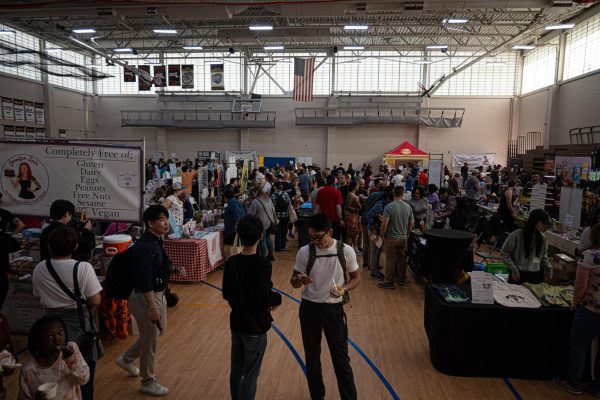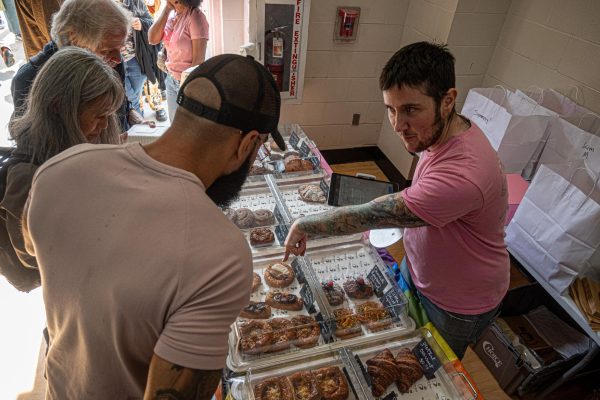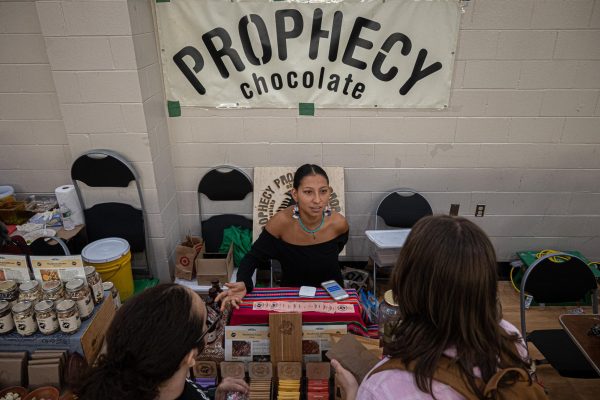Over 80 tables and booths filled the Reggie Lewis Track and Athletic Center in Roxbury for the 29th annual Boston Veg Food Fest on Sept. 28 and 29, marking the longest-running veg festival in the country. Put on by the Boston Vegetarian Society, an all-volunteer educational nonprofit, the two-day event draws vegans, vegetarians, and non-vegetarians alike to experience what plant-based food and goods have to offer.
The Boston Vegetarian Society (BVS) organizes this event to introduce the world of plant-based cooking to everyone, no matter their current dietary habits.¬Ý
Their goal, ‚Äúisn‚Äôt to make sure there are more vegetarians in the world,‚Äù David Havelick, a BVS organizer said, but to ‚Äúmake sure there are more vegetarian and vegan meals [available to everyone].‚Äù¬Ý
The Boston Veg Food Fest is just one of the events that BVS holds in addition to regular and special gatherings for educational and dining purposes.¬Ý

Overall, Havelick says, they‚Äôre focused on building a community.¬Ý
‚ÄúIt‚Äôs really delicious food, that‚Äôs what we’re focused on, not shaming or guilting people into doing things,‚Äù Havelick said. ‚ÄúThis can be fun and delicious and exciting and a community around doing the right thing for the planet.‚Äù¬Ý
That community showed up in the thousands to flock to the event and sample what the exhibitors had to offer. From full meals to sweet treats to hygiene products, the full spread of what “plant-based” can mean is on display. While many of the exhibitors are from the Boston area—like Jennifer Lee’s Bakery, the provider of gluten-free desserts for the Emerson dining hall—many more have traveled across state lines to be there.
One out-of-town exhibitor was Tootie’s Tempeh, a Maine-based, worker-owned cooperative that sustainably ferments tempeh, a soybean-based protein. Sarah Speare, the CEO and co-founder of the collective, thinks that the company was able to improve the taste of the tempeh while farming it equitably, getting rid of its bitter aftertaste by replacing plastic bags used in fermentation with metal pans. She says it makes it “much friendlier, so more people can enjoy it.” On the table, each step of the process was shown: the soybeans, the fermenting, and samples of the finished product: a salty, nutty, cube of ground-breaking tempeh.
While this alternative vegan protein is delicious, many exhibitors create vegan and vegetarian replicas of foods we know and love, such as baked goods and chocolate, from Clarke‚Äôs Cakes and Cookies to Prophecy Chocolate.¬Ý

Clarke‚Äôs Cakes and Cookies, a woman-owned and family-run bakery in Boston, creates vegan versions of well-loved treats such as banana bread, chocolate chip cookies, and carrot cakes that remind Karen Clarke, the founder and mother of the Clarke family, of the after-school treats baked for her as a child. Her goal is to create treats just like that from ethical and plant-based ingredients that, most importantly, have a ‚Äúlot of love.‚Äù¬Ý
Ingredients matter to the exhibitors here, like for Prophecy Chocolate, a Vermont-based chocolate shop/cafe that uses beans directly from Indigenous family farmers in Peru.¬Ý

Their goal is to ‚Äúbridge the North and the South,‚Äù Wasi Rivera, the exhibitor for the company explained. Prophecy Chocolate hopes that, by bringing beans from the south to the north, they can be part of that effort.¬Ý
“It’s alive,” Rivera said of the chocolate,“It has a life force to it.”
The exhibitors aren‚Äôt the only ones passionate about plant-based food. Angus, a senior mechanical engineering student at Tufts University, has attended this event for two years. They have been a vegetarian their whole life, but made the jump to veganism when they learned about the cruelty of factory farms for dairy and eggs.¬Ý
“Making the switch was easier than I thought it would be … It was a very meaningful thing [to do],” they said.